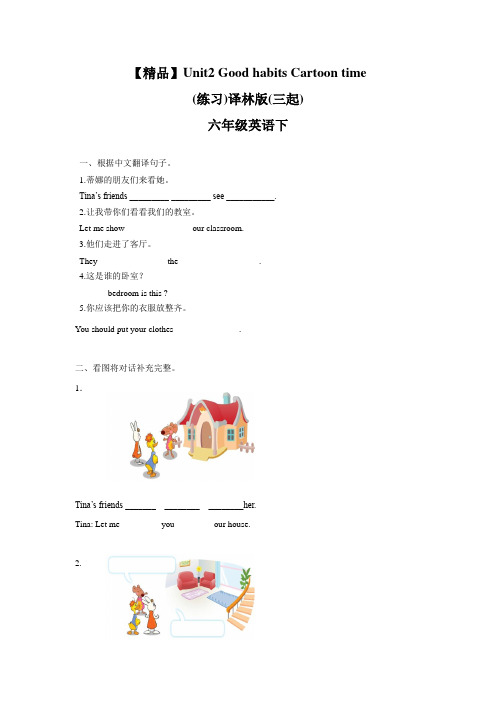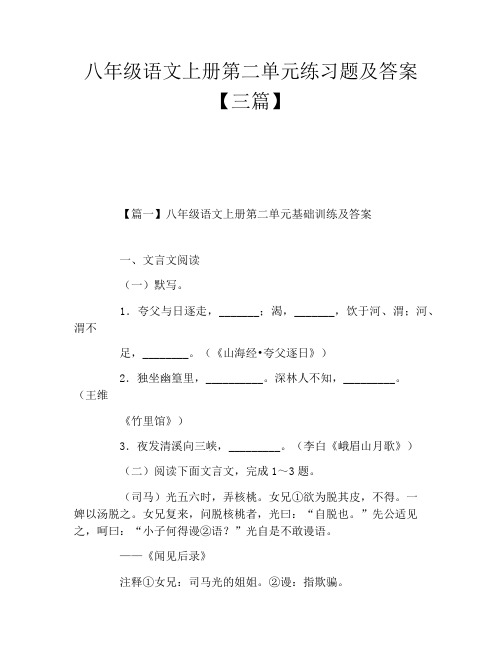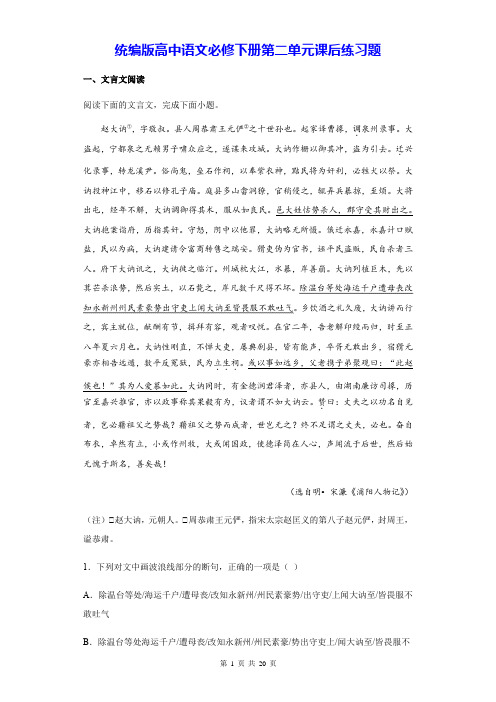第二单元练习及翻译答案
2020新译林版新教材高中英语必修一unit2第二单元课文及翻译(附课本练习答案)

2020新译林版新教材⾼中英语必修⼀unit2第⼆单元课⽂及翻译(附课本练习答案)Book 1 Unit 2ReadingWhen teenagers’ bodies and minds go through a period of rapid development, every part of their lives can be influenced. The magazine article below is about teenagers’ relationships with their parents. Before you read the article, think about the following questions:What physical and mental changes do you experience as you become a teenager How do you deal with themWhat do you think “strangers under the same roof” meansStrangers under the same roof?Does every dinner with your parents seem to turn into a battle? Have your once warm and open conversations become cold and guarded? Do you feel that you just cannot see eye to eye with them on anything? You are not alone. Heated arguments and cold silences are common between teenagers and their parents.Teenagers’ physical changes may result in such family tensions. You may feel anxious that you are developing at a different rate to your friends, shooting up in height or getting left far behind. You might worry about your changing voice, weight problems or spots. When it all gets too much, your parents are often the first targets of your anger.It can be a big headache to balance your developing mental needs too. You enter a strange middle ground— 5 10 15 Reading 17 no longer a small child but not quite an adult. You have both a new desire for independence and a continued need for your parents’ love and support. You feel ready to be more responsible and make decisions on your own. Unfortunately, your parents do not always agree and that makes you feel unhappy. “Why can’t they just let me go?” you may wonder. On the other hand, when you are struggling to control your feelings, you wish they could be more caring and patient —sometimes they forget that growing up is a rough ride. It can be difficult when your parents treat you like a child but expect you to act like an adult. All of this can lead to a breakdown in your relationship.Although sometimes it may seem impossible to get along as a family, you can take action to improve the situation. The key to keeping the peace is regular and honest communication. When you disagree with your parents, take a minute to calm down and try to understand the situation from their point of view. Perhaps they have experienced something similar and do not want you to go through the same pain. After you have thought it through, explain your actions and feelings calmly, listencarefully, and address their concerns. Through this kind of healthy discussion, youwill learn when to back down and when to ask your parents to relax their control.Just remember that it is completely normal to struggle with the stress thatparent-child tensions create, and that you and your parents can work together to improve your relationship. The good news is that this stormy period will not last. Everything will turn out all right in the end, and the changes and challenges of your teenage years will prepare you for adulthood.Extended readingRead the short story about a mother’s love for her children.Mama and her bank accountEvery Saturday night Mama would sit down by the kitchen table and count out the money Papa had brought home.“For the rent.” Mama would count out the big silver pieces.“For the groceries.” Another group of coins.“I’ll need a notebook.” That would be my sister Christine, my brother Nels or me.Mama would put one or two coins to the side. We would watch with anxious interest. At last, Papa would ask, “Is that all?”And when Mama nodded, we could relax a little. Mama would look up and smile, “Good. We do not have to go to the Bank.”We were all so proud of Mama’s Bank Account. It gave us such a warm, secure feeling.When Nels graduated from grammar school, he wanted to go on to high school. “It will cost a little money,” he said.Eagerly we gathered around the table. I took down a box and laid it carefully in front of Mama. This was the “Little Bank”. It was used for sudden emergencies, such as the time when Christine broke her arm and had to be taken to a doctor.Nels listed the costs of the things he would need. Mama counted out the money in the Little Bank. There was not enough.“We do not want to go to the Bank,” she reminded. We all shook our heads.“I will work in Dillon’s grocery after school,” Nels volunteered.Mama gave him a bright smile and wrote down a number. “That’s not enough,” Papa said. Then he took his pipe out of his mouth and looked at it for a long time. “I will give up smoking,” he said suddenly.Mama reached across the table and touched Papa’s arm. Then she wrote down another figure.“I will look after the Elvington children every Friday night,” I said. “Christine can help me.”Now there was enough money. We all felt very good because we did not have to go downtown and draw money out of Mama’s Bank Account. So many things came out of the Little Bank that year: Christine’s dress for the school play, my little sister Dagmar’s operation ... Whatever happened, we always knew we still had the Bank to depend upon.That was twenty years ago.Last year I sold my first story. When the check came, I hurried over to Mama’s and put it in her lap. “For you,” I said, “to put in your Bank Account.”I noticed for the first time how old Mama and Papa looked. Papa seemed shorter, and Mama’s hair was silver now.“Tomorrow,” I told Mama, “you must take it to the Bank.”“You will go with me, Katrin?”“That won’t be necessary. Just hand it to the teller. He’ll pay it into your account.” Mama looked at me. “There is no account,”she said. “In all my life, I’ve never been inside a bank.”And when I didn’t—couldn’t—answer, Mama said seriously, “It is not good for little ones to be afraid—to not feel secure.”(Adapted from Kathryn Forbes’s Mama’s Bank Account, which has 17 short stories and describes the struggles and dreams of a family in San Francisco in the early 1900s)TranslationUnit 2Reading最熟悉的陌⽣⼈?每天的家庭晚餐幻化成激烈战⽃?热情开朗的谈话蜕变成冷淡警惕?⽆论什么事情都夏⾍语冰?其实⼤家都⼀样。
苏教译林版英语六年级下册第二单元练习及解析

【精品】Unit2 Good habits Cartoon time(练习)译林版(三起)六年级英语下一、根据中文翻译句子。
1.蒂娜的朋友们来看她。
Tina’s friends _________ _________ see ___________.2.让我带你们看看我们的教室。
Let me show ______ ________ our classroom.3.他们走进了客厅。
They _______ ________the ________ ________.4.这是谁的卧室?______ bedroom is this ?5.你应该把你的衣服放整齐。
You should put your clothes _______ _______.二、看图将对话补充完整。
1.Tina’s friends _______ ________ ________her.Tina: Let me _______ you ________ our house.2.They_______ ________ the living room.Tina: This is our living room.Miss Rabit: It’s ______ and _________.3.They go into Tina’s bedroom.Tina: This is my __________.Mr Duck: It’s _______ , but it’s _________4.They are in Bobby’s bedroom. They see a lot of books and toys on the ________. Miss Rabbit: ________bedroom is this?Tina: It’s my _________.5.They cannot see Bobby.Tina: Bobby, _______ are you ?Bobby: I’m here, _______ the bed.Tina: You should _______ your books and toys _______ __________.三、句型转换1.My sister usually puts things in order. (对划线部分提问)_________usually _________ things in order?2. He often helps his mother do housework. (改为一般疑问句)__________ he ________ help his mother _________ housework?3. The girl could dance three years ago. (改为否定句)The girl __________ __________ three years ago.4. The boy is reading carefully.(对划线部分提问)_________ _______ the boy ___________?5. Jim does badly at school. (改为同义句)Jim doesn’t ________ ________ at school.答案及解析:一、e to her2.you around3.go into living room4. Whose5.in order二、1. come to see show around2. go into big clean3. bedroom small nice.三、1.Who puts 2.Does often do3.couldn’t dance4.How is reading5.do well解析:1. 划线部分是my sister,意思是我的姐妹,即是人,对人进行提问用特殊疑问词who,后面的内容照抄。
人教PEP英语四年级下册第二单元Unit 2 Part A 和Part B配套练习题(附答案)

Unit 2 What time is it?Part A第一课时一、翻译下列句子。
1.School is over.______________________________2.Let’s go to the playground.______________________________3.What time is it?______________________________4.It’s time for dinner.______________________________5.It’s 6 o’clock.______________________________二、单项选择。
( ) 1. It’s time ______dinner.A. atB. forC. to( ) 2. Let’s ______!A. goesB. goC. going( ) 3.—Where are you? —_______A. I’m Sarah.B. It’s 6 o’clock.C. I’m in Tianjin. ( ) 4. Time to ______.A. go to homeB. goes homeC. go home ( ) 5. What time______?A. it isB. is itC. it’s三、按要求完成下列各题。
1. It’s 3 o’clock.(就画线部分提问)______________________________________________2.I’m in New York.(改为一般疑问句)______________________________________________3.I am in Beijing.(就画线部分提问)______________________________________________4.to, It’s, school, time, go to(.)______________________________________________5.Shall we go to the playground.(改为let型的祈使句)_______ ______to the playground.答案:一、1.放学了。
2020年春PEP四年级英语第二单元课文翻译及练习答案

2020年春PEP四年级英语第二单元课文翻译及练习答案Unit 2 Whɑt time is it? 几点了?ALet's tɑlkHi! School is over.Let's go to the plɑyground.你好!放学了。
我们去操场吧。
OK.好的。
Whɑt time is it now?现在几点了?It's 5 o'clock.五点了。
Time to go home, kids.该回家了,孩子们。
Whɑt time is it?几点了?It's 6 o'clock.It's time for dinner.六点了。
该吃晚饭了。
Oh! Let's go!噢!我们走吧!Let's leɑrnWhɑt time is it?几点了?It's 9 o'clock.It's time for English clɑss.Let's go!九点了。
该上英语课了。
我们走吧!breɑkfɑst English clɑss lunch music clɑss PE clɑss dinner早餐英语课午餐音乐课体育课正餐Let's doIt's time for breɑkfɑst. Let's drink some milk.该吃早饭了。
我们喝些牛奶吧。
It's time for lunch. Let's hɑve some chicken.该吃午饭了。
我们吃些鸡肉吧。
It's time for dinner. Let's eɑt some rice.该吃晚饭了。
我们吃些米饭吧。
It's time for PE clɑss. Let's jump ɑnd run.该上体育课了。
我们跑跑跳跳吧。
It's time for English clɑss. Let's reɑd ɑnd write.该上英语课了。
八年级语文上册第二单元练习题及答案三篇

八年级语文上册第二单元练习题及答案【三篇】【篇一】八年级语文上册第二单元基础训练及答案一、文言文阅读(一)默写。
1.夸父与日逐走,_______;渴,_______,饮于河、渭;河、渭不足,________。
(《山海经•夸父逐日》)2.独坐幽篁里,__________。
深林人不知,_________。
(王维《竹里馆》)3.夜发清溪向三峡,_________。
(李白《峨眉山月歌》)(二)阅读下面文言文,完成1~3题。
(司马)光五六时,弄核桃。
女兄①欲为脱其皮,不得。
一婢以汤脱之。
女兄复来,问脱核桃者,光曰:“自脱也。
”先公适见之,呵曰:“小子何得谩②语?”光自是不敢谩语。
——《闻见后录》注释①女兄:司马光的姐姐。
②谩:指欺骗。
1.解释加粗字。
(1)弄核桃弄:____。
(2)女兄欲为脱其皮皮:____。
(3)先公适见之适:____。
(4)呵曰:“小子何得谩语?”呵:____。
2.翻译文言句子。
(1)一婢以汤脱之。
译文:________________________________________________。
(2)光自是不敢谩语。
译文__________________________________________________。
3.这则故事给我们什么启示?__________________________________________________________二、现代文阅读(一)阅读下面文字,完成1~9题。
①大概是太过于念念不忘了,连阿长也来问《山海经》是怎么一回事。
这是我向来没和纵使她说过的,我知道她并非学者,说了也无益;但既然来问,也就都对她说了。
②过了十多天,或者一个月罢,我还很记得,是她告假回家以后的四五天,她穿着新的蓝布衫回来了,一见面,就将一包书掏出我,高兴地说道:③“哥儿,有画儿的‘三哼经’,我给你买来了!”④我似乎遇着了一个霹雳,全体都震悚起来;赶紧去接过来,打开纸包,是四本的书,略略一翻,人面的兽,九头的蛇,……果然都在内。
综合教程2Unit2练习答案及B课文翻译阅读教程2Unit2练习答案

综合教程2 Unit 2Part II Text AText Organization1. 1) expository2) the essay is meant to explain something, that is, the author's view of life.3) that one can live a life full of riches without being rich financially.2.Main ideas:Part I (The writer's encounter with a boy who raised the question "Are you poor?")Part II (In search of an answer the writer finds that not having expensive possessions doesn't make him feel poor mainly because he enjoys life in many other ways.)Part III (In conclusion, the writer thinks he's grown to understand more about himself because of the boy's question.)Language Sense Enhancement1.attain;2. wear and tear;3. dependable;4. modest;5. primarily;6. minimal;7. exceptionally;8. illness-free;9. spirited; 10. energizingVocabulary1.abrupt; emotional; bless; wear and tear; dated; consequences; seemingly; in contrast to; Curiosity; genuine; primarily; sentiments2.1) confronted with more than one problem, try to solve the easiest one first.2) vital to the existence of all forms of life3) some confusion among the students about what to do after class to follow up on the subject.4) nothing more than a job and an apartment to be happy.5) tickled him to think that she'd come to ask his advice.3.1) a lingering; fabricating; sentiments2) fill out; every item; vital; consequences3) be denied; tangible; cherish; attainWords with Multiple Meanings1.It is a long trip and will take us five hours by bus.2.She arrived early and took a front row seat.3.Don't take me for a fool.4.It takes a lot of imagination to fabricate such a story.5.My uncle will take me (along on his trip) to the Arctic this summer.6.He took the dinner plate I passed to him.7.Kevin took second prize in the weight-lifting competition.8.If you don't take my advice, you will regret it.Usagehanging; to give: to return; being praised; not having written; to say; to open; being helped Comprehensive Exercises1.well-off/affluent; dated; falling into; bracket; deny; tangible; pursuit; cherishes; out of place; abr upt; focus; donations2.Consume; fueled; annual;plain; physically; security; indicates; equally; traditional; follows Translation1)The company denied that its donations had a commercial purpose.2)Whenever he was angry, he would begin to stammer slightly.3)Education is most cherished tradition in our family. That's why my parents never took me to dinner atexpensive restaurants, but sent me to the best private school.4)Shortly after he recovered from the surgery, he lost his job and thus had to go through another difficult phase of his life.5)In contrast to our affluent neighbors, my parents are rather poor, but they have always tried hard to meet our minimal needs.Part III Text BComprehension: b b d c d dTranslation:1.只有在美国,一个亿万富翁才能像普通百姓一样生活,而不受干扰。
(完整word版)小学英语pep六年级上册翻译练习试题及答案

小学英语pep六年级上册翻译练习试题及答案翻译练习1、有时候我走路去上学。
Sometimes I go to school on foot.2、---请问去动物园怎么走?---你可以坐12路公车去。
---Excuseme.How can I get to the zoo? ---You can go by the No.12 bus.3、我通常做地铁去上学,因为它速度快。
Usually I go to school by subway, because it's fast.4、每个国家的交通灯都是一样的。
The traffic lights are the same in every country.5、在中国,司机在右行驶。
但在英国,司机在左行驶。
In China drivers drive on the right side of the road. But in England, drivers drive on the left sideof the road,6、如果你骑自行车、或走路,你必须知道交通规则。
If you go by bike or on foot, you must know the traffic rules.7、我们怎样去公园?How can we get to the park?8、绿灯意思是'通行'。
The green light means "Go".9、每个学生都必须记住交通规则。
Every students must remember the traffic rules.10、---我可以步行去吗?---当然可以,如果你愿意的话。
---Can I go there on foot?--Of course, if you like.11、---图书馆在哪里?---先向前走,然后在邮局那儿向左拐。
然后你就看见了。
---Where is the library?---First go ahead, then turn right at the post office.Then you can see it.12、---请问,附近有电影院吗?---对,有的。
统编版高中语文必修下册第二单元课后练习题(含答案解析)

统编版高中语文必修下册第二单元课后练习题一、文言文阅读阅读下面的文言文,完成下面小题。
赵大讷①,字敬叔。
县人周恭肃王元俨②之十世孙也。
起家译曹掾,调.泉州录事。
大盗起,宁都泉之无赖男子啸众应之,遂谋来攻城。
大讷作栅以御其冲,盗为引去。
迁.兴化录事,转龙溪尹。
俗尚鬼,垒石作祠,以奉紫衣神,黠民将为奸利,必牲犬以祭。
大讷投神江中,移石以修孔子庙。
庭县多山畬洞獠,官稍侵之,辄弄兵暴掠,至烦。
大将出屯,经年不解,大讷调御得其术,服从如良民。
邑大姓怙势杀人,郡守受其财出之。
大讷抱案诣府,历指其奸。
守怒,阴中以他罪,大讷略无所慑。
俄迁永嘉,永嘉计口赋盐,民以为病,大讷建请令富商转售之瑞安。
猾吏伪为官书,诬平民盗贩,民自杀者三人。
府下大讷讯之,大讷徙之临汀。
州城枕大江,水暴,岸善崩。
大讷列植巨木,先以萁芒杀浪势,然后实土,以石甃之,岸凡数千尺得不坏。
除温台等处海运千户遭母丧改知永新州州民素豪势出守吏上闻大讷至皆畏服不敢吐气。
乡饮酒之礼久废,大讷讲而行之,宾主就位,献酬有节,揖拜有容,观者叹悦。
在官二年,告老解印绶而归,时至正八年夏六月也。
大讷性刚直,不惮大吏,屡典剧县,皆有能声,卒胥无敢出乡,宿猾元豪亦相告远遁,数平反冤狱,民为立生祠...。
或以事如远乡,父老携子弟聚观曰:“此赵侯也!”其为人爱慕如此。
大讷同时,有金德润君泽者,亦县人,由湖南廉访司掾,历官至嘉兴推官,亦以政事称其果毅有为,议者谓不如大讷云。
赞.曰:丈夫之以功名自见者,岂必藉祖父之势哉?藉祖父之势而成者,世岂无之?终不足谓之丈夫,必也。
奋自布衣,卓然有立,小或作州牧,大或闻国政,使德泽简在人心,声闻流于后世,然后始无愧于斯名,善矣哉!(选自明•宋濂《浦阳人物记》)(注)①赵大讷,元朝人。
①周恭肃王元俨,指宋太宗赵匡义的第八子赵元俨,封周王,谥恭肃。
1.下列对文中画波浪线部分的断句,正确的一项是()A.除温台等处/海运千户/遭母丧/改知永新州/州民素豪势/出守吏/上闻大讷至/皆畏服不敢吐气B.除温台等处海运千户/遭母丧/改知永新州/州民素豪/势出守吏上/闻大讷至/皆畏服不第1页共20页敢吐气C.除温台等处海运千户/遭母丧/改知永新州/州民素豪/势出守吏/上闻大讷至/皆畏服不敢吐气D.除温台等处/海运千户/遭母丧/改知永新州/州民素豪势/出守吏上/闻大讷至/皆畏服不敢吐气2.下列对文中加点的词语相关内容的解说,不正确的一项是()A.古代表示官职变动的词语有很多,其中“除”,是任命的意思。
- 1、下载文档前请自行甄别文档内容的完整性,平台不提供额外的编辑、内容补充、找答案等附加服务。
- 2、"仅部分预览"的文档,不可在线预览部分如存在完整性等问题,可反馈申请退款(可完整预览的文档不适用该条件!)。
- 3、如文档侵犯您的权益,请联系客服反馈,我们会尽快为您处理(人工客服工作时间:9:00-18:30)。
构词法
kilo: kilogram memo: memorandum gym: gymnasium lib: liberation doc: doctor vet: veterinarian prep: preparatory auto: automobile flu: influenza
构词法
二、用动词的恰当形式填空
1.send out 发出(信号 、声音) 2. stand up for支持、维护 3. pass for被认为是,被当做 4. were closing in on逼近 5. starting up启动,发动 6. went through 排除千难万险 7. fill out填写 8. fall into 分为,属于
同样,传感器还能通过接受在轨道上 运行的卫星发出的信号检测路况并大 大减少你陷入交通拥堵的可能性。
They can also monitor road conditions by receiving radio signals sent out from orbiting satellites and greatly reduce your chances of getting stuck in traffic jams.
medicare: medical care email: electronic mail comsat: communication satellite newscast: news broadcast skyjack: sky hijack Eurodollar: European dollar brunch: breakfast and lunch telecast: television broadcast Oxbridge: Oxford and Cambridge
但另一方面,也带来了危害, 尤其是公路死亡事故。 On the other hand, they have brought hazards, especially highway fatalities.
然而,现今由于计算机技术和电子传感器 的使用,有可能消除发生的大多数交通事 故。
However, today the application of computer technology and electronic sensors in designing and manufacturing cars makes it possible to eliminate most of traffic accidents.
The expansion of urban areas in some African countries has been causing a significant fall in living standards and an increase in social problems.
3. 研究表明大气中的二氧化碳的含量 与全球温度密切相关。
动词的ing或ed分词
1. swimming pool 2. drawing board 3. enriched Middle English 4. disturbing change 5. fully developed prototype 6. canned foods 7. working population 8. puzzling differences
例如,装在你汽车上的电子 传感器能检测到空气中的酒 精雾气并拒绝启动引擎。 For example, electronic sensors mounted in your car can detect alcohol vapor in the air and refuse to start up the engine.
The research shows that atmospheric carbon dioxide levels are closely correlated with global temperatures.
4. 最近公共汽车的车辆行驶 频率已有所改善,从15分钟 缩短到12分钟一班。 The frequency of the bus service has been improved from 15 to 12 minute recently.
4. Manufactures usually begin by building the prototype of a new model before they set up a factory to make the cars.
5. Medical evidence shows that smoking and lung cancer are correlated in all racial groups.
1.空气中有一种不寻常的寂 静,只有远处响着大炮的声 音 e was an unusual quietness in the air, except for the sound of artillery in the distance.
2. 在某些非洲国家城市的扩展已引起 生活水平相当大的下降和社会问题的 增多。
三、改写句子
1. The new car design incorporates all the latest safety features. 2. To suspend our hammock, we need to find two trees ten feet apart.
3.Jason faces up to 10 years in prison for offering bribery money to the US navy official responsible for awarding lucrative contracts to his construction firm.
四、选词填空 1. the application、remote、 has turned into a reality、 are poised to 2. that vibrate、can detect、 frequency 3. lanes、are mounted in、 alert a、hazard
5. 那位跳水运动员立在跳水 板边沿,只等教练发出信号 便会立刻跳下。 The diver stood on the edge of the diving board, poised to jump at the signal from the coach.
汽车自从发明以来使交通运输发生了革命 性的变化,永远地改变了人们的生活、旅 行和办事的方式。 Automobiles have, since their invention, revolutionized transportation, changing forever the way people live, travel, and do business.
